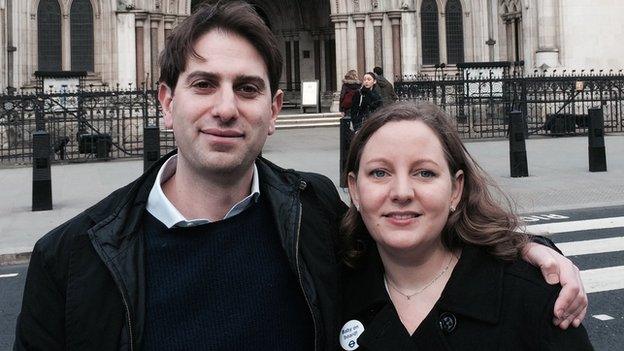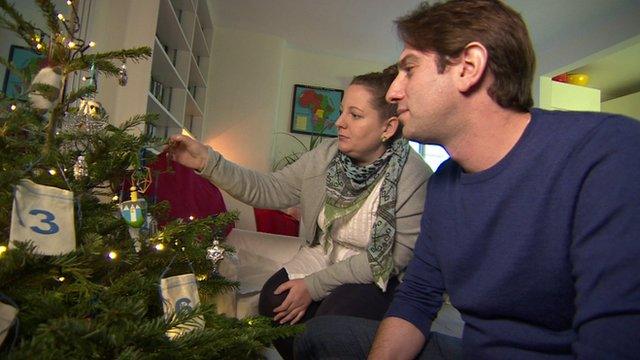Civil partnerships ban challenged by heterosexual couple
- Published

A heterosexual couple is challenging the ban on members of the opposite sex entering into civil partnerships.
Charles Keidan and Rebecca Steinfeld, of Notting Hill, London, say their case is a "basic issue of discrimination and equality".
They are filing a judicial review at the High Court in London to have the ban lifted.
The 2004 Civil Partnership Act stipulates that only same-sex couples are eligible for civil partnerships.
The review is expected to be heard later next year.
The couple say they are challenging the registrars at Chelsea Register Office, who on 1 October refused to register their notice of intention to form a civil partnership "on the basis of our genders and sexual orientation".
They are also challenging the government, which they say "continues to discriminate against long-term cohabiting opposite-sex couples".
Their test case is believed to be the first attempt in the British courts to make partnerships available to heterosexual people.
The government has said it consulted on the issue and found a lack of consensus, so does not plan to make any changes to the law.
But Ms Steinfeld, 33, who is an academic, as is her 38-year-old partner, said she "feels hopeful" their legal challenge will bring about a change in the legislation.
"We've had an enormous amount of public support," she told BBC News.
"It just seems so logical and reasonable that any social institution in a democratic society should be open to anybody.
"A civil partnership is a much more accurate reflection of how we see each other and our relationship, in a way that being a husband and a wife just would not mesh."

Civil Partnerships explained
Legally recognised union between a same-sex couple
Equal legal treatment in matters including inheritance and next-of-kin arrangements
Marriage ceremonies must be public and can be conducted by clergy; partnership can be made in private
Failed partnerships require a legal dissolution, like divorce
Political, religious and social considerations influenced choice of the term "civil partnership"
Most campaigners accepted title because they had secured the underlying rights

Mr Keidan said: "As a long-term cohabiting couple we want the protections under law that are currently denied to us because we're not choosing marriage."
He and Ms Steinfeld say they have received £3,678 in public donations, external towards their legal costs of £7,800 so far and have paid the remainder with their own money.
The couple are being supported by human rights campaigner Peter Tatchell, who is head of the Equal Love legal campaign which aims to redress what it says is an imbalance between heterosexual and homosexual partnership rights.
The BBC's legal affairs correspondent, Clive Coleman, says there is a legal collision course looming between the Civil Partnership Act, which is restricted to same sex couples, and the Equality Act, which prevents public institutions discriminating on grounds of sex.
This was a legal collision bound to happen at some point, our correspondent added.
The couple's legal challenge coincides with a private member's bill sponsored by the Conservative MP for Worthing East and Shoreham, Tim Loughton, which seeks to remove the words "same sex" from the Civil Partnerships Act.
This would extend civil partnerships to members of the opposite sex.
Mr Loughton said: "The law needs to recognise that those people are in a legitimate relationship, they need to recognise that within the tax system and they need to give stability to the children who are growing up in those relationships.
"This is not about undermining anything. This is about bringing stability to loving couples."
Civil partnerships, which came into force in 2005, mostly give same-sex couples the same legal rights as married couples, although some campaigners believe the arrangement lacks the status enjoyed by marriage.
- Published13 December 2014
